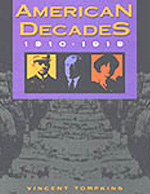The 1910s
Introduction
The Muckrakers of the 1900s gave way to investigative reporting and war correspondents in the 1910s. Political and social pressures helped form the decade with the four-way presidential election of 1912, the release of the film "Birth of a Nation," and World War I all helping to divide the American public.
Newspapers were a source of activism for political parties and for social equality. Radio was beginning to make an impact on society and journalism, and the 1910s would lay the groundwork for the rise of radio in the 1920s.
Journalists and media personalities
Carr Van Anda

Carr Van Anda was an editor at the New York Times when the Titanic struck an iceberg on Sunday April 14, 1912. The next morning, the Times was the only newspaper to report that the Titanic had indeed sunk -- other newspapers having simply reported that the ship had been damaged. When the survivors returned to New York, Van Anda organized the coverage by renting one floor of a local hotel and installing an unprecedented four phone lines. Van Anda reinvented the way the media covered disasters.
William Monroe Trotter

William Monroe Trotter was born April 7, 1872, and raised in the wealthy Hyde Park suburb of Boston. He was the only African American in his high school, but was elected class president and graduated as the valedictorian. After college at Harvard, Trotter founded the activist newspaper The Boston Guardian. The paper was "propaganda against discrimination," and fought for equal rights for blacks. Trotter's paper frequently railed against Woodrow Wilson because the president had segregated some public offices. Trotter led a delegation to the White House 1914, where he debated Wilson until he was thrown out. William Monroe Trotter is remembered as an early civil rights activist and the founder of an African American newspaper.
- Trotter confronts Woodrow Wilson (video)
Richard Harding Davis

Richard Harding Davis was the first modern war correspondent. By the age of 26 he had become the managing editor of Harper's Weekly, but left to cover the Spanish War. He then went to Cuba to cover the Spanish-American War, then the Greco-Turkish War, and then the Boer War in Africa. By the time World War I began in Europe, Davis had become such a respected war correspondent that he was paid $32,000 a year to report on it. He was captured by the Germans in 1914 and accused of being a British spy, but was released soon after they found he was an American. He covered the war until 1915, when he left because he disagreed with the Allied restrictions on the press.
Peggy Hull

Henrietta "Peggy" Deuell, a Kansas farm girl, left home at an early age to become a journalist. After her marriage to a fellow journalist, Peggy Hull covered General Pershing's pursuit of Pancho Villa in Mexico, and survived submarine-infested waters to report from the Western Front during World War I -- without any official recognition or assistance from the United States government, which frowned on the idea of female war correspondents. With help from General Perusing, Hull became the first officially accredited female war correspondent and promptly accompanied American soldiers to Siberia during the Russian revolution. In Shanghai during the Japanese invasion of the city, Hull stayed to cover the action, and would continue coving the war in the Pacific after the United States entered the Second World War. She was known for featuring the "ordinary" man in her stories. In 1944, an American G. I. wrote to her, saying "You will never realize what those yarns of yours . . . did to this gang. . . . You made them know they weren't forgotten."
Floyd Gibbons

Floyd Gibbons, a war correspondent for the Chicago Tribune, was aboard the troop transport, S.S. Laconia, when it was sunk by a German U-boat. Later, he was wounded in the trench warfare in Europe. Having been hit by three bullets, the grievously wounded Gibbons waited hours for the sun to set before he could retreat from where he was pinned down by enemy fire.
Lowell Thomas

Depressed by the carnage on the Western Front, Lloyd Thomas a war correspondent with an interest in the new art of documentary filmmaking, traveled with his cameraman to the Middle East in search of a story. He found and filmed T. E. Lawrence, an eccentric British officer leading a revolt of the Arabs against the Ottoman Empire. Thomas joined a traveling show with his documentary film With Allenby in Palestine and Lawrence in Arabia. The success the film made Thomas famous as an adventuring journalist, and made "Lawrence of Arabia" a legend. Thomas would have a long career as a radio newscaster and narrator of newsreels. He also appeared on the first television news broadcast in 1939. He would retire from journalism in 1976, after almost 60 years in the business.
- Lowell Thomas -- Lawrence of Arabia, PBS (web site)
- Lowell Thomas -- Britannica Online Encyclopedia (web site)
Benito Mussolini

Benito Mussolini broke from Socialism in 1914 when he founded a paper called "The Italian People." He also started a pro-war group and coined the term "fascism" from a symbol of Roman power. After being wounded by a grenade in 1917, he returned to edit his paper until he was elected to the Italian parliament in 1921. His skills as a journalist would help him win election to head the Italian government, and he would prove to be a popular international figure until the 1930s.
- D'annunzio inspires Mussolini (video)
- Mussolini the journalist (video)
George Creel

George Creel began his newspaper career at the Kansas City World, then started the Kansas City Independent. He was chosen by Wilson to head the Committee for Public Information in 1917, which was responsible for raising American support for the war effort. He organized poster campaigns, music tours, speaking engagements and cartoons to galvanize American sentiment. He also organized a campaign in America and Europe to raise support for Wilson's Fourteen Points and he is credited in part with the acceptance of the plan.
- Committee for Public Information (video)
Political scene

President Woodrow Wilson
1910-1919 was a decade of unrest throughout the world. In America, the decade began with a contentious election between the Democrat Woodrow Wilson, Republican Taft, Progressive Roosevelt, and the Socialist Eugene Debs. With Republican voters split between Taft and Roosevelt, Wilson won 42 percent of the popular vote and 82 percent of the electoral college.
- The 1912 presidential election (video)
The outcome might have been different if the Roosevelt camp leaked an letter taken from Wilson's luggage that would have disclosed an affair between Wilson and Mary Peck.
- Woodrow Wilson, American Experience -- PBS (web site)
- Wilson, the romeo? Roosevelt, the gentleman? (video)
- Wilson's inaugural (video)
- Wilson, the reformer (video)
- Wilson, the segregationist (video)
- Wilson's end
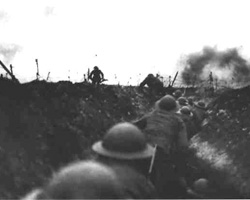
British soldiers going "over the top" during World War I.
After the assassination of Archduke Ferdinand in 1914, a web of allegiances pulled Europe into war. The isolationist United States entered the war in 1917 as U.S. pressures against Germany grew with revelations that they had fermented unrest against the U.S. in Mexico.
The Treaty of Versailles ended the war in 1919, but the Allied leaders, Lloyd George of England, Vittorio Orlando of Italy, and Georges Clemenceau of France, forced unreasonable restrictions on Germany. Wilson's Fourteen Points were a starting point, and the League of Nations was established, but the U.S. Congress was dissatisfied with the arrangement and never allowed the U.S. to join the League.
- World War I: Trenches on the Web (web site)
- From assassination to war (video)
- The sinking of the Lusitania (video)
- Wilson's 14 Points (video)
- Germany sues for peace (video)
- Armistice (video)
- The "stab in the back" (part one) (video)
- The "stab in the back" (part two) (video)
In Russia, the Bolsheviks led by Lenin seized control of the countr and the United States was worried that a revolution might be incited here as well. Legislation that was eventually ruled unconstitutional restricted Americans' speech. Eugene Debs was sentenced to 10 years in prison under the Sedition Act of 1918, and Emma Goldman deported in 1919 under the California Criminal Syndicalism Act. "
- Emma Goldman, American Experience -- PBS (web site)
Social climate
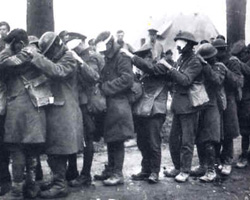
British casualties of a gas attack
In July of 1914, a Serbian terrorist shot and killed Austrian Archduke Ferdinand, heir to the Austria-Hungary throne, while he visited the city of Sarajevo in Bosnia. Thanks to a web of confusing alliances and agreements between the various European powers, the continent descended into war. Austria marches on Serbs; the Serbians call on their ally Russia; the German Kaiser unsuccessfully urged his cousin, the Russian czar, not to intercede; the Germans came to the defense of Austria; once attacked, Russia drew in France; the Germans marched into France through Belgium -- which was neutral, thus bringing England, Italy, The Ottoman Empire and -- eventually -- the United States to enter the war.
World War I produced new technologies that killed soldiers more effectively than had ever been seen. The use of poison gases, heavy artillery, machine guns, tanks, blimps and airplanes contributed to a stalemate that dragged the battles into muddy trench warfare with forces separated by a no-man's land.
- The horrors of war (video)
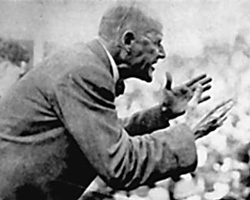
Eugene V. Debs speaking in 1918.
Socialism became a political force in American politics. Eugene V. Debs ran for president in 1912, his forth attempt, while Victor Berger, a Socialist newspaper owner from Wisconsin, was elected to U.S. Senate. Both men were punished under new laws that condemned political dissent.
Berger's most influential newspaper, the Milwaukee Leader, established in 1911, became the vehicle for his vocal opposition to World War I. Berger's views on World War I were complicated by the socialist view and the difficulties around his Germanic heritage. However, he did support his party's stance against the war.
When the United States entered the war and passed the Espionage Act in 1917, Berger's continued opposition made him a target: He and four other Socialists were indicted under the Espionage Act in February 1918. Berger was eventually sentenced to 20 years in federal prison. Berger appealed and his sentence was ultimately overturned on a technicality on January 31, 1921, by the Supreme Court, three years after the end of the First World War.
In spite of his being under indictment at the time, the people of Milwaukee elected Berger to the House of Representatives in 1918. When Berger arrived in Washington to claim his seat, Congress formed a special committee to determine whether a convicted felon and war opponent should be seated as a member of Congress. On November 10, 1919, they concluded that he should not, and declared the seat vacant. Wisconsin promptly held a special election to fill the vacant seat and on December 19 elected Berger a second time. On January 10, 1920, the House again refused to seat him and the seat remained vacant until 1921, when Republican William H. Stafford claimed the seat after defeating Berger in the 1920 general election.
Media moments
1914 — Birth of a Nation

D. W. Griffith's film, Birth of a Nation based on the Thomas Dixon novel The Clansman was a huge success and put Griffith at the top of the film industry. Called a racist and picketed by black leaders such as William Monroe Trotter, Griffith released Intolerance as a counterpoint, but to much less acclaim. The most popular film of its time, Birth of a Nation would ultimately ruin Griffith's career.
April 15, 1912 — The Titanic sinks

At 1:20 a.m. on April 15, a Marconi wireless station in New Foundland picks up an SOS from the R.M.S. Titanic. Carr Van Anda of the New York Times calls to find that the Titanic's wireless was silent half hour after the distress call was received. Before 3:30 a.m. Van Anda and staff organize the story, retrieving a passenger list and pictures of the Titanic. Reports of icebergs were received from ships in the area where the Titanic last transmitted. The following morning the New York Times led with the story that the Titanic had sunk, while other papers report inconclusive news.
When ships carrying rescued passengers arrived, Van Anda rented out a floor in a hotel a block from where R.M.S. Carpathia would dock with survivors and install four telephone lines direct to New York Times offices. Van Anda persuaded Guglielmo Marconi, the inventor of wireless, to interview the Titanic's wireless operator on board the Carpathia and scored another scoop with the last messages of Titanic.
June 28, 1919 — Peace treaty ends First World War, sets stage for second

Treaty of Versailles, signed in Paris, ended the First World War. Woodrow Wilson presented his Fourteen Points to keep the world safe for democracy, but other Allied leaders wished to punish Germany. At left, Lloyd George of England, Orlando Vittorio of Italy, Georges Clemenceau of France and U.S. president Woodrow Wilson in Paris were negotiating the treaty that would breed resentment in Germany, leading to the rise of Adolf Hitler and World War II.
- Revenge at Versailles (video)
- Wilson in Europe (video)
Trends in journalism
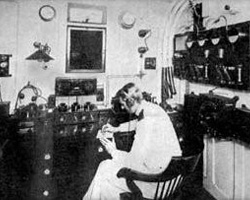
The radio room of the Titanic
During the 1910s, American's interest in muckraking journalism waned and publishers shifted focus as their audience's tastes changed. Magazines like Vanity Fair, The Smart Set and Vogue focused on the lifestyles of the rich, while the squalid lives of the underclass became the staple of tabloid newspapers and confessional magazines.
New technologies also made the 1910s important. The Radio Act of 1912 marked the first time Congress attempted to regulate the new technology, also known as the wireless telegraph. The act put radio waves in control of government, which divided the bandwidths up for different uses. Each broadcaster was assigned a three- or four-letter codes and all ships were required to carry wireless radio equipment, due in part to the Titanic disaster in April of 1912. The use of radio would expand during the 1910s, especially after wartime advances funded by the United States military filtered down into commercial use in the media industry.
With the start of the First World War, modern war journalism was born upon the battlefields of Europe and the Middle East, and nurtured by journalists like Richard Harding Davis, Floyd Gibbons, Peggy Hull and Lowell Thomas. Hundreds of American journalists provided unprecedented and unmatched coverage of the war. Back on the home front, modern propaganda in America was born when President Woodrow Wilson created the Committee of Public Information, headed by George Creel, to help manage the flow of news and information to the American populace.
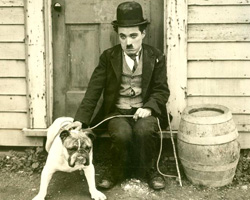
Charlie Chaplin in "The Kid." The film debuted in 1921 and was written and directed by Chaplin.
Movies became increasingly popular with the public, but many serious actors refused to work in the new medium. One of the early silent film stars and a beloved actor of the early century was Charlie Chaplin. His first big-studio picture came out in 1914, which he starred in and directed. Chaplin was also known to write the accompanying music for his silent films. Other stars of the first age of film include Rudolf Valentino, Lillian Gish, Buster Keaton, Lon Chaney, Mary Pickford and Fatty Arbuckle.
D. W. Griffith's Birth of a Nation would prove to be the most popular and most controversial film of the decade. Highlighting the rise of the Ku Klux Klan, Griffith's reputation would be stained by his most "successful" film. Lillian Gish called him "the father of film" and Charlie Chaplin called him "the teacher of us all."
Newsreels, still in their childhood as a new medium, would continue to mature. Woodrow Wilson, during the twilight of his presidency, spent many hours watching newsreels of himself during the happier moments of his administration.
- Charlie Chaplin (web site)
- Charlie Chaplin (video)
- Rudolf Valentino (video)
- Pathe newsreels (video)

